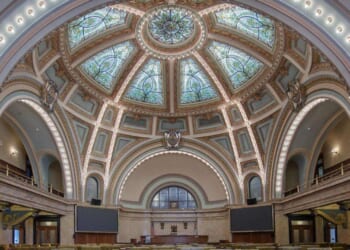I’ve said it before and I will say it again: Donald Trump is resoundingly right, sometimes.
The US President has an idiosyncratic grasp of economics, to put it tactfully, but when he declared in 2018, ‘If you don’t have steel, you don’t have a country’, he was correct.
The irony is that Trump’s 25 per cent tariffs were yet another blow to the UK’s beleaguered industry.
Its troubles reached a crescendo this weekend when MPs were hauled back to Parliament for an emergency sitting to decide the fate of the Scunthorpe steelworks.
Reform MP Richard Tice – another man I don’t often agree with – was bang on when he said our steel industry was a ‘catastrophe’, and that it had been both Labour and Tory ‘negligence’ that had brought us to this point. Like him, I see no other option than its immediate nationalisation.
Steel is in my blood and bone. My father, grandfather, uncles and cousins were proud Teesside steelmen. The fortunes of the industry have played out in our family and shaped all our lives.
Dad was one of the last people to leave Head Wrightson, which made bridges found around the world, when it closed in the late 1980s.
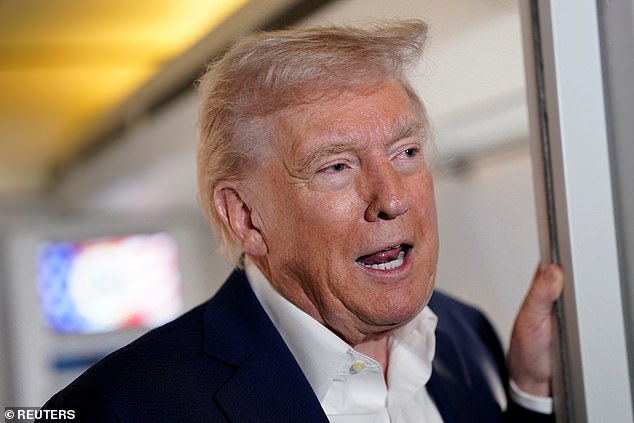
I’ve said it before and I will say it again: Donald Trump (pictured) is resoundingly right, sometimes. The US President has an idiosyncratic grasp of economics, to put it tactfully, but when he declared in 2018, ‘If you don’t have steel, you don’t have a country’, he was correct, writes Ruth Sunderland
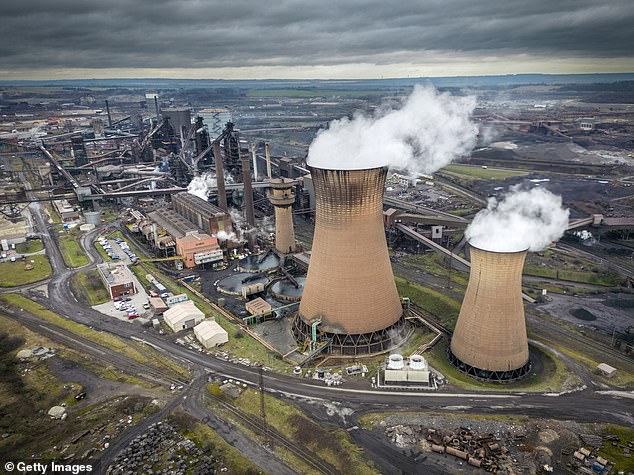
The irony is that Trump’s 25 per cent tariffs were yet another blow to the UK’s beleaguered industry. Its troubles reached a crescendo this weekend when MPs were hauled back to Parliament for an emergency sitting to decide the fate of the Scunthorpe steelworks (pictured), says Ruth Sunderland

Reform MP Richard Tice (pictured) – another man I don’t often agree with – was bang on when he said our steel industry was a ‘catastrophe’, and that it had been both Labour and Tory ‘negligence’ that had brought us to this point. Like him, I see no other option than its immediate nationalisation, Ruth Sunderland writes
My cousin Andrew followed his father Malcolm into the Redcar steelworks when he left school and lost his job there a decade ago when the Thai owners shut it down.
The threat of that fate is now looming over the 2,700 workers at Scunthorpe and, sadly, I am not surprised.
At the time of the 2019 sale of British Steel to Jingye, a Chinese conglomerate, I warned that the deal offered only false hope.
There is zero pleasure in seeing my prophecies of disaster come true.
The takeover was waved through in the middle of Boris Johnson’s 2019 election campaign.
Helpfully to the Conservatives, it averted the loss of thousands of jobs in a Red Wall constituency.
Then, I advocated the government should at least try to protect UK interests by keeping a golden share and taking a seat on the board. The predatory deal was given a green light with no such safeguards.
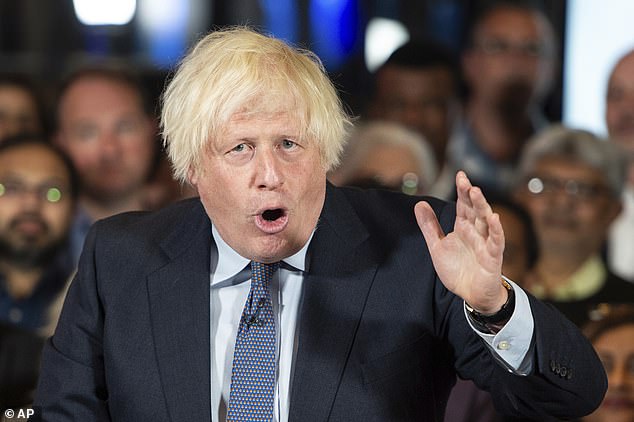
At the time of the 2019 sale of British Steel to Jingye, a Chinese conglomerate, I warned that the deal offered only false hope. There is zero pleasure in seeing my prophecies of disaster come true. The takeover was waved through in the middle of Boris Johnson’s 2019 election campaign, Ruth Sunderland says. Pictured: Boris Johnson
Johnson’s government appeared to take it at face value when Li Ganpo, the former Communist Party official turned chairman of Jingye, turned on the treacle hose.
He promised to ‘create a splendid future’ with an open chequebook for investment – words that now sound as cold as the blast furnaces without a bailout.
Politicians turned a blind eye to the fact the Chinese had helped eviscerate our industry by dumping cheap steel on world markets.
Nor would they admit what was staring them in the face: that British Steel would be a Trojan horse for China, allowing it access to our know-how and skills, with the option of discarding the plant and workers down the line.
And so it has proved, leaving the Government with little choice but to nationalise British Steel, which is no doubt the last thing Chancellor Rachel Reeves wants to do at this juncture.
The country’s finances are on a knife-edge and the tax burden is already at its highest since the aftermath of the Second World War.
Loading the national balance sheet with an open-ended liability to keep the steel industry going is an unappetising prospect.
Saving Scunthorpe, however, goes beyond questions of profitability. It is too important to fail – just as the banks were in the financial crisis.

The Government has been left with little choice but to nationalise British Steel, which is no doubt the last thing Chancellor Rachel Reeves (pictured) wants to do at this juncture, writes Ruth Sunderland
Britain cannot leave itself the only member of the G7 unable to produce its own steel.
Sadly, our industry has been the victim of poor and unscrupulous ownership for decades.
Prior to Jingye, British Steel had been owned by private equity firm Greybull Capital, which bought the business in 2016 for £1 and whose stewardship was widely criticised.
Producers have also been hobbled by Net Zero mania. Steel-makers here pay nearly 50 per cent more for electricity than those in France and Germany and are calling on the Government to set a price cap.
Steel has also been stigmatised by a cultural contempt for industry.
It has been fashionable among the bien-pensant elite to brand steel as dirty, basic and unnecessary in a modern, high-tech economy – they see it as a rather regrettable activity that takes place in poorer towns far from their bijoux London haunts.
Several years ago, I was interviewed for a job where two of the men on the panel sneered at the idea that the steel industry was worth saving, and at me for daring to argue otherwise.
This is not about sentimentality or harking back to a mythical lost industrial past.
If we don’t have the ability to make our own steel, we cannot hope to keep this country secure, let alone prosperous, in an increasingly threatening world.

Pictured: Energy Secretary Ed Milliband
Nationalisation is not a route I would normally advocate but when there is a national emergency, which this is, then it is the sensible option.
Labour will no doubt hope this is a short-term solution and may wish to find a buyer or at least a commercial partner.
Ministers should be cognisant, though, that the worst possible outcome at this point is yet another awful owner.
Any new scavengers who come knocking at the door must be given short shrift.
Naturally at this point the focus is on the financial downside. But that is not the whole story.
It is not all cost – there is also a huge opportunity.
The Government does recognise this and published a steel strategy earlier this year. We need steel for our defence industry, green energy infrastructure, for new rail lines – and we can make it here, instead of importing it from abroad.
Ed Miliband, in his zeal for Net Zero, ought to take note that enormous amounts of steel will be needed if we are to move to environmentally friendly energy sources including new nuclear.
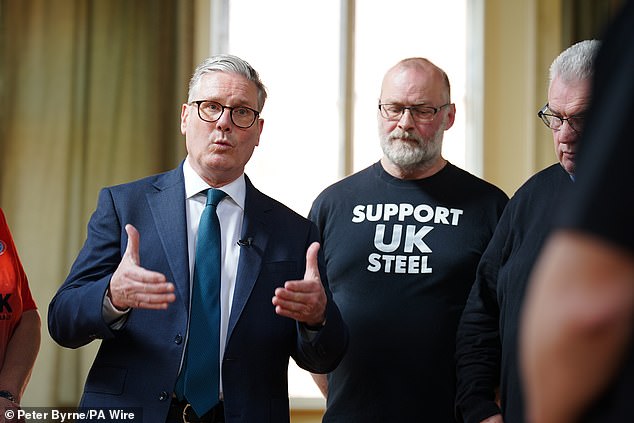
Pictured: Sir Keir Starmer during a visit to meet British Steel workers in Appleby Village Hall near Scunthorpe on April 12
Offshore wind alone will need 25 million tonnes of steel between now and 2050, which is a potential £21 billion market for UK producers. Government, now and in the future, can play a big role in this by adopting a ‘Buy British’ approach to procurement.
The industry itself is becoming greener with the use of new steel-making techniques. The UK has a chance to take the lead on this – but that will not happen if we lose our capacity.
It will probably surprise many to learn that the steel industry still employs 34,000 people and supports another 40,000 in the supply chain.
True, this is a fraction of the numbers working in steel in the glory years, but these are well-paid jobs in relatively poor communities.
There is a very heavy human and economic toll – as my family knows all too well – when they are lost.
If we can make UK steel great again, it will give the country a cadre of highly skilled and valuable workers, not just operating furnaces but in advanced research and development.
Teessiders like to boast that we built the world with our steel, from the girders in Churchill’s War Rooms to Canary Wharf and Sydney Harbour Bridge.
It’s just possible, if we learn the right lessons from this debacle, that we could do so again.




